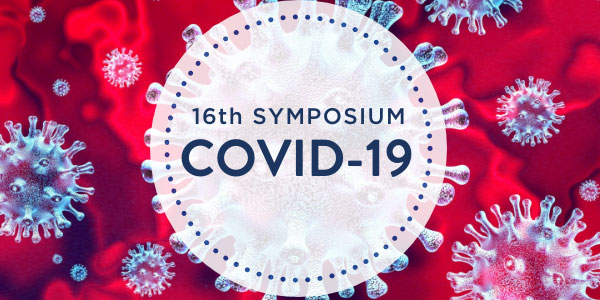NYMC and TCUS Host 16th COVID-19 Symposium
NYMC and TCUS presented how the pandemic has progressed in two years, new potential treatments and the Omicron variant.

The 16th COVID-19 Symposium offered an opportunity to not only look ahead at the challenges presented by the the pandemic, but to look back and appreciate the progress and knowledge that has been attained in the two years since the initial reports of the infectious disease in China first appeared. The online symposium, presented by New York Medical College (NYMC) and Touro College and University System (TCUS) on December 16, 2021, examined the emerging Omicron variant, new potential treatments and a look at what a return to an in-person work environment could entail.
Edward C. Halperin, M.D., M.A., chancellor and chief executive officer of NYMC and provost for biomedical affairs at TCUS, opened the webinar reflecting on the time that has passed since news about SARS-CoV-2 first rose to prominence and how it has affected our society. “We are now 24 months into [the pandemic], Dr. Halperin said. “No matter what the ups and downs are, every five to six weeks we’ll be back to teach you what you need to know about the science, ethics, public policy and medical care related to the COVID-19 pandemic.”
Much was learned about COVID-19 in the past two years including the public’s realization of how much this virus would affect daily life, which was the focus of the presentation by Robert W. Amler, M.D., M.B.A., dean of the School of Health Sciences and Practice and vice president for government affairs. “We all hoped [COVID-19] would blow by. By December, this virus has destroyed millions of lives, it has trashed the economies of every nation on Earth and it has changed the fate of almost every family across the globe,” Dr. Amler said during his presentation, “The Pandemic at Two Years of Age.” The presentation included the progression in information and precautions for COVID-19, beginning with social distancing and hand-hygiene, to mask-wearing and eventually, vaccines and herd immunity.
Chandra Shekhar Bakshi, D.V.M., Ph.D., associate professor of pathology, microbiology and immunology, took a deeper look at variants and their structure in his presentation, “A Primer on COVID-19 Viral Mutations and Their Meaning.” Dr. Bakshi showed how different variants mutate and how that can affect virus transmissibility and efficacy of current treatments, which in Omicron’s case, is in its early studies.
Recent news surrounding oral treatments have been centered around the Merck oral treatment for COVID-19, molnupiravir, and a pill being developed by Pfizer called Paxlovid, which were both discussed by Marisa A. Montecalvo, M.D., director of health services and professor of medicine, in her presentation, “What We Know About Oral Potential Treatments for COVID-19.” “There are some safety concerns with [molnupiravir]. Although there were no safety concerns in the trial that were evident, in theory there are concerns,” Dr. Montecalvo said, saying that the drug, which was voted on the FDA to push toward emergency use authorization, will only be approved for patients who fit certain criteria.
Although there is still uncertainty regarding the full return from remote work, James Vaccarino M.S., director of career resource services and adjunct professor of human resources at Touro Graduate School of Business, provided a look at what employers should do to facilitate a return to in-person workdays, whether that means being open in their communication, allowing time for employees to re-adjust and addressing employee concerns. “We should definitely keep in mind that we need to be transparent and that measures be taken for the safety of our employees,” Mr. Vaccarino said.
In the two years since the pandemic has spread throughout the country, news outlets have turned to experts for information and guidance. Jennifer Riekert, M.B.A., vice president of communications and strategic initiatives, presented tips for health care professionals who are approached by members of the press and shared how NYMC faculty informed the public at the onset of the pandemic through media interviews in her presentation, “Health Care Providers Speaking in the Media During the Pandemic.” “We were making sure to clear up any misinformation in the media and making sure health care providers were presenting facts.”
Alan Kadish, M.D., president of NYMC and TCUS, hosted the closing question and answer session including discussions on the Omicron variant and booster vaccination shots.
